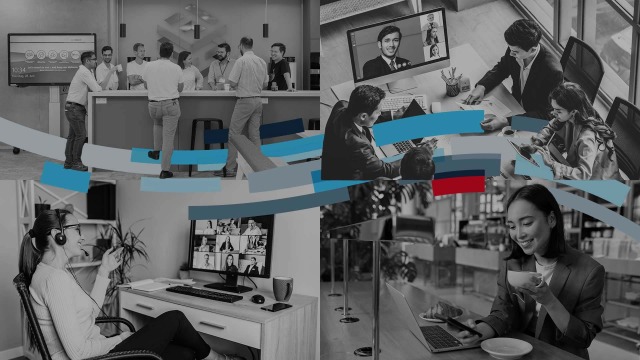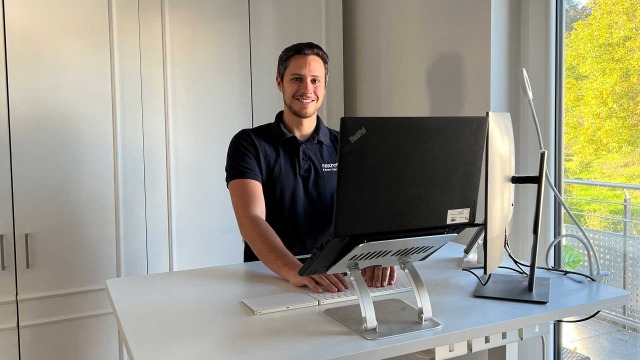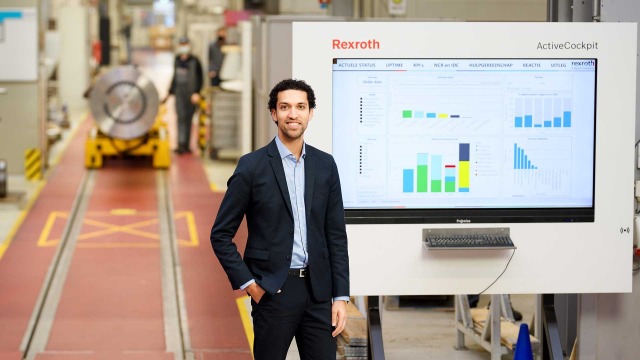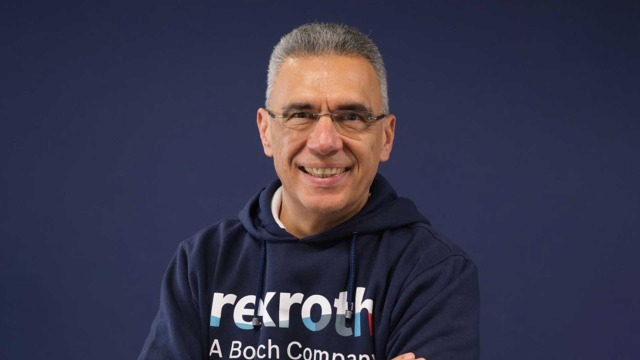

Select your location
Bosch Rexroth around the world
Asia & Pacific
Europe


The events of the past few years have forced us to change our way of working and have shown us that hybrid working can be highly effective. So now, whether our teams are at home, in the office or on the go, we want to empower every person to do their best work. And for those whose work doesn’t necessarily require them to be on site, that also means: wherever they perform best. We call this Smart Work.
Smart Work is about creating a lasting change in our working culture. At the core of a hybrid working model lays the understanding that geography holds no barriers to performance and productivity – it can in fact, improve them. During the COVID-19 pandemic we took important steps towards the digitalization of the working day: testing and establishing new virtual collaboration tools that enabled teams to work together seamlessly. At the same time, the office became an important space for creative collaboration and personal exchange. With Smart Work we combine the best of both worlds. We’ve come to understand that when a team chooses the environment that best fits their business and personal needs, they can become more efficient and more innovative, which benefits our people and our customers.
However, while the ability to combine working from home with working from an office or other location is an important part of a hybrid working model, Smart Work isn’t just about where people work. Rather, it’s about changing our working culture and our understanding of how we work together. The core of this initiative is trust in our colleagues and teams and the common understanding that it’s performance that counts. Importantly, the initiative is defined by the people themselves.
HR Director, Nina Litobarski says, “A future-proof working model isn’t just about remote or hybrid working. For the long-term success of both the business and its people, it’s essential that associates can work in an environment that encourages them to perform at their best. Accountability, respect and trust in everyday interactions are therefore the foundations of our future-proof working models. While these are the core values of Smart Work, we also respect local differences. So, the implementation of Smart Work can vary from one country or culture to the next – and even from one team to another. Not every task can be performed remotely, so we don’t have a one size fits all model. After all, Bosch Rexroth is a very diverse company.”

Nina Litobarski
With Smart Work Workshops, we provide a handy tool that helps each team to build their own future-proof working model, based on their tasks and objectives, as well as their individual and team needs. Teams decide how they’ll communicate and collaborate, especially when they’re not working together on-site. The workshop can be repeated every so often, if circumstances change and the team feels they need to rethink their way of working. This makes Smart Work a dynamic concept that evolves alongside our learnings.
“In order to achieve excellence, we must retain and attract the best people in the business. With Smart Work, we believe we’re setting a dynamic framework for a future-oriented and attractive working culture”, explains Nina Litobarski. “On one side our associates gain flexibility and on the other side it’s an opportunity to demonstrate their entrepreneurial passion through increased personal and team accountability.”

While I found the Smart Work model to be a challenge at first, I was quickly surprised by how well working in hybrid form works. You may have less in-person contact with colleagues, but there are advantages, such as increased productivity through more flexibility. I’ve been able to plan my work week more efficiently – if I’m busy with appointments for the whole day, I can have them virtually, on other days, I go to the office. Although working from home can be more comfortable, personal contact is still a priority for me.
When I started as a trainee in 2021, my team was already used to the hybrid model of working. My onboarding was done virtually together with the team. Later it was initially a bit difficult to meet people and start working with them virtually, but they supported and helped me to understand the structure. I now think this way of working is great.
Our team has had virtual “after-work parties” and similar events online. These events have helped me in establishing strong connections with my colleagues.
Now, if I have a day with lots of virtual meetings, I prefer to work from home. This saves my travel time. But I also love being in the office to connect with my colleagues in person.


I work in software development and my job includes phases of individual work as well as phases of intense discussion with my team. Even though it’s possible for me to work from home, I still like to come to the office too. It helps with creativity and the innovation process if I sit with my colleagues. I can get information straight away or spontaneously brainstorm ideas without scheduling a meeting. Many good ideas and solutions would be lost if we weren’t able to elaborate on them together while the idea is fresh. On a more personal level, if you don’t see each other at all you risk losing your sense of belonging and connection as a team. It’s important to have fun and maintain team spirit to keep everyone’s motivation high.
In our department we have always worked with colleagues across the globe and our team is spread throughout various countries. While management traditionally tends to be more ‘command & control’, I am glad to work for a company that has shifted to a more trust-and-support management style guiding a hybrid global team.
As someone who has always enjoyed independence at work, I benefit from a leadership that is focused on results based on coaching and guiding. Whether I work in my office in Germany or I am supporting our regions locally, Smart Work empowers me to be flexible. It helps me to save time, be more efficient and to contribute to my team’s responsibilities whenever and wherever it makes sense.
Smart Work helps me to enlarge my network and meet interesting characters with different mindsets and competences, which also broadens my strategic perspective. I believe Smart Work will enhance even more in the future and I am happy to be part of it.


Working in hybrid teams has proven to be more beneficial than I’d expected. For example, meetings are more concise. We’ve had big meetings where we’ve used virtual collaboration methods such as white boards for brainstorming. Moreover, with the good camera quality of today, it really feels as if you’re working together. There are colleagues that I’ve been working with virtually for a long time but have never seen in real life. However, the first time we met in person, it felt as if we already knew each other well. This is the upside of today’s technology.
There are challenges as well. For example, it’s easy to overbook your calendar with back-to-back virtual meetings, making it hard to take a break. The casual chats at the coffee machine in the office also bring a lot of value both from a social and work perspective. This is why I’m in favor of a “healthy” split between virtual and face-to-face work.
The benefit of the Smart Work model is being able to work from wherever you want. I’ve been working in the Bosch Rexroth office in Ulm for over a year, having moved to Germany from Istanbul, Türkiye. I have strong connections with my family and friends in Istanbul and thanks to Smart Work, I’m able to work temporarily from there. I can still easily communicate and collaborate with my team.
Now I spend half my days in the office and half working from home. Having a more flexible working approach means I can still have face-to-face connection at the office, as well as being able to focus on my work at home.


The pandemic was a big challenge, but it provided us with a unique opportunity to foster our Smart Work approach. We expanded our sales meetings and celebrations to include more people across different levels, so that all our colleagues could learn and grow. We also increased the amount of time we spend with our customers – be it physically or virtually. These days we come together in person for big meetings, workshops and when we’re onboarding new people.
Because of the circumstances, Smart Work became a natural reality. What could have been a big hurdle is now perceived as the best way to create a successful future work environment.